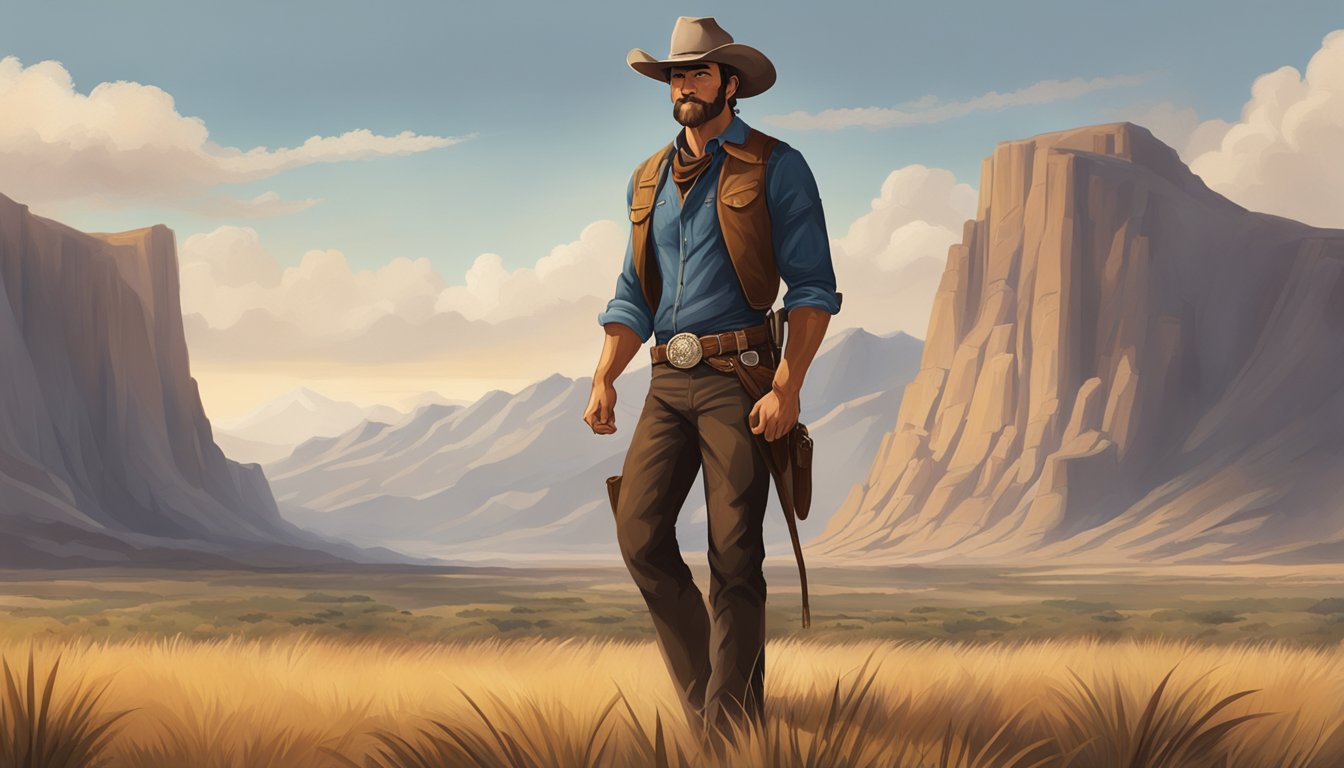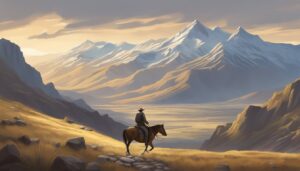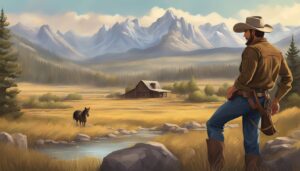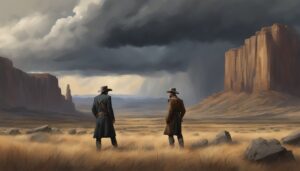Western dramas have captivated audiences with their gritty tales of frontier life and larger-than-life protagonists. Two standout characters that have left their mark are John Dutton from “Yellowstone” and Cullen Bohannon from “Hell on Wheels.” Both men embody the rugged individualism and moral complexity associated with the American West.
John Dutton, portrayed by Kevin Costner, is the patriarch of the Dutton family and owner of the largest contiguous ranch in the United States. His character represents the modern cowboy, fighting to preserve his land and legacy in Montana. Cullen Bohannon, played by Anson Mount, is a former Confederate soldier turned railroad worker in the post-Civil War era, seeking revenge for his family’s murder.
While both characters are impressive in their own right, Cullen Bohannon edges out as the more compelling Western hero due to his character arc and the historical backdrop of his story. Bohannon’s journey from vengeance-driven outlaw to a key figure in the construction of the Transcontinental Railroad showcases a depth of personal growth and redemption that resonates with viewers. John Dutton, though formidable, remains more static in his role as a wealthy rancher protecting his interests.
Understanding the Western Genre

The Western genre has evolved beyond its traditional roots, embracing new themes and settings while retaining core elements. This evolution has given rise to the Neo-Western, a subgenre that blends classic Western motifs with contemporary storytelling.
Defining the Neo-Western
Neo-Westerns transport familiar Western themes to modern settings. They explore conflicts between tradition and progress, often featuring characters grappling with changing societal norms. Shows like “Yellowstone” and “1883” exemplify this trend.
Taylor Sheridan, creator of “Yellowstone,” has become a prominent figure in Neo-Western storytelling. His work often examines power dynamics and family legacies against rural American backdrops.
AMC’s “Hell on Wheels” serves as another example of the Neo-Western. Set during the construction of the First Transcontinental Railroad, it bridges historical and contemporary themes.
Neo-Westerns frequently tackle complex moral issues, moving away from the clear-cut hero/villain dichotomy of classic Westerns. This nuanced approach allows for deeper character development and more intricate plotlines.
The Legacy of ‘Yellowstone’
‘Yellowstone’ has left an indelible mark on television, captivating audiences with its portrayal of the modern American West. The show’s impact extends beyond entertainment, touching on themes of family, power, and the changing landscape of rural America.
The Dutton Family Saga
The Dutton family stands at the center of ‘Yellowstone’, their story weaving a complex tapestry of loyalty, ambition, and survival. John Dutton leads his clan in a fierce battle to protect their ancestral land from outside threats.
The show explores the dynamics between generations, highlighting the tensions between tradition and progress. Each family member contributes to the richness of the narrative, from Beth’s sharp-tongued business acumen to Kayce’s struggle between two worlds.
‘Yellowstone’ draws parallels to classic family sagas, updating the genre for a contemporary audience. The Duttons’ story resonates with viewers, reflecting broader societal conflicts and the challenges faced by ranching communities.
Character Analysis: John Dutton
Kevin Costner’s portrayal of John Dutton anchors the series, presenting a multifaceted character that embodies the spirit of the American West. As the patriarch of the Dutton family, John is a man of unwavering determination and complex morality.
John’s character arc explores themes of legacy, power, and the lengths one will go to protect what they love. His leadership style, often ruthless yet rooted in a deep connection to the land, drives much of the show’s conflict.
Costner brings depth to John Dutton, balancing moments of tenderness with steely resolve. This nuanced performance has earned critical acclaim and solidified John Dutton as an iconic figure in modern Western television.
Symbolism and Themes in ‘Yellowstone’
‘Yellowstone’ is rich with symbolism, using the vast Montana landscape as a metaphor for the characters’ internal struggles. The Dutton Ranch itself represents a way of life under threat, symbolizing the broader changes in rural America.
The show explores themes of identity, belonging, and the clash between tradition and modernity. Native American storylines add depth, addressing historical injustices and contemporary challenges faced by indigenous communities.
‘Yellowstone’ doesn’t shy away from difficult topics, tackling issues like land rights, political corruption, and environmental concerns. These themes resonate with viewers, making the show more than just entertainment but a reflection of real-world tensions.
Impact of ‘Yellowstone’ Season 5
Season 5 of ‘Yellowstone’ has further cemented the show’s place in popular culture. The season has expanded the Dutton family’s influence, with John taking on a new role as Montana’s governor.
This narrative shift has allowed the show to explore broader political themes while maintaining its focus on family dynamics. Beth Dutton‘s character continues to be a fan favorite, her sharp wit and strategic mind driving key plotlines.
The success of Season 5 has led to increased interest in the ‘Yellowstone’ universe, spawning spin-offs like ‘1883’. This expansion demonstrates the enduring appeal of the Dutton saga and its ability to captivate audiences across multiple series.
The Grit of ‘Hell on Wheels’

‘Hell on Wheels’ depicts the harsh realities of post-Civil War America during the construction of the Transcontinental Railroad. The show’s gritty portrayal centers on complex characters navigating a world of ambition, revenge, and survival.
Cullen Bohannon: A Man Defined by the Railroad
Cullen Bohannon, a former Confederate soldier, becomes the driving force behind the railroad’s progress. His journey from vengeance-seeking outsider to railroad leader showcases his adaptability and determination. Bohannon’s skills as a soldier translate into his role as a tough but fair leader.
His interactions with figures like Thomas ‘Doc’ Durant and The Swede highlight the moral complexities of the era. Bohannon’s relationship with freed slave Elam Ferguson adds depth to his character, illustrating personal growth and changing attitudes.
Historical Context of ‘Hell on Wheels’
The show is set against the backdrop of the 1860s American West. This period was marked by rapid expansion, technological advancement, and social upheaval following the Civil War.
The construction of the Transcontinental Railroad serves as more than just a setting. It represents America’s ambition and the clash between progress and traditional ways of life. The series depicts the impact on Native American tribes and the influx of immigrant workers.
Cheyenne, Wyoming becomes a focal point, representing the transient nature of these railroad towns. The show’s attention to historical details, from clothing to weaponry, enhances its authenticity.
Dynamics of Vengeance and Redemption
Bohannon’s initial quest for vengeance against the Union soldiers who killed his family drives the early narrative. This personal mission evolves into a larger journey of redemption and purpose.
The show explores how characters like Bohannon and Durant navigate moral gray areas in pursuit of their goals. The harsh environment and high stakes bring out both the best and worst in people.
Relationships form and break under intense pressure, revealing characters’ true natures. The constant threat of violence and betrayal keeps tensions high, reflecting the era’s instability.
Key Characters and Performances

The success of both “Yellowstone” and “Hell on Wheels” hinges on the compelling performances of their lead actors and supporting casts. These portrayals bring depth and authenticity to the Western genre.
Kevin Costner as John Dutton
Kevin Costner’s portrayal of John Dutton in “Yellowstone” is a masterclass in nuanced acting. As the patriarch of the Dutton family, Costner embodies a complex character torn between tradition and progress.
His gruff exterior belies a deep love for his family and land. Costner’s subtle facial expressions and commanding presence make John Dutton a formidable figure on screen.
The actor’s extensive experience in Western films lends credibility to his performance. Costner brings gravitas to the role, making John Dutton’s struggles feel authentic and relatable.
Anson Mount as Cullen Bohannon
Anson Mount’s portrayal of Cullen Bohannon in “Hell on Wheels” is equally impressive. Mount infuses the character with a raw intensity that captivates viewers.
Bohannon’s journey from Confederate soldier to railroad man is filled with moral ambiguity. Mount expertly navigates this complexity, showing Bohannon’s growth and inner turmoil.
His physical commitment to the role is evident in every scene. Mount’s gritty performance brings the harsh realities of the American West to life.
Supporting Casts’ Contribution
Both shows benefit from strong supporting casts that enrich the narrative. In “Yellowstone,” Kelly Reilly shines as Beth Dutton, John’s fiercely loyal daughter. Her sharp wit and vulnerability add depth to the family dynamic.
Wes Bentley and Cole Hauser deliver standout performances as Jamie and Rip Wheeler, respectively. Their complex relationships with John Dutton drive much of the show’s drama.
“Hell on Wheels” features a diverse ensemble that reflects the melting pot of the American frontier. Each character brings a unique perspective to the story, creating a rich tapestry of Western life.
Finn Little’s addition to “Yellowstone” as Carter introduces a new dynamic, showcasing the show’s ability to evolve its cast while maintaining its core themes.
Exploring Themes and Motivations

John Dutton and Cullen Bohannon grapple with complex motivations that drive their actions throughout their respective series. Both characters navigate treacherous landscapes where family, justice, and power intersect in compelling ways.
Family and Legacy
John Dutton’s primary motivation revolves around preserving his family’s ranch and legacy. He fiercely protects the Yellowstone from external threats, often resorting to morally ambiguous methods. Dutton’s relationships with his children are strained yet central to the plot, as he grooms them to inherit his empire.
Cullen Bohannon’s family motivation stems from a tragic past. The murder of his wife and son fuels his initial quest for revenge in Season 1 of Hell on Wheels. As the series progresses, Bohannon forms new bonds and finds surrogate family connections among his fellow railroad workers.
Justice and Morality
Both characters embody the anti-hero archetype, operating in morally gray areas. John Dutton’s sense of justice often aligns with his personal interests, leading him to clash with law enforcement and government officials. He justifies his actions as necessary to protect his land and way of life.
Cullen Bohannon starts as a vengeful figure but evolves throughout the series. His pursuit of justice becomes more nuanced as he faces complex ethical dilemmas. Bohannon’s moral compass shifts as he balances personal vendettas with broader responsibilities to the railroad and its workers.
Survival and Power
The struggle for survival and power drives both characters’ actions. John Dutton fights to maintain control of his vast ranch against corporate interests, rival ranchers, and developers. His power plays extend into local politics and business dealings.
Cullen Bohannon’s journey is marked by a constant battle for survival in the harsh frontier environment. He rises through the ranks of the railroad, facing physical and political challenges. Bohannon’s pursuit of power is more pragmatic, focused on completing the railroad and securing his position within the company.
Cultural and Filming Locations

The filming locations of “Yellowstone” and “Hell on Wheels” play crucial roles in establishing their distinct Western atmospheres. These settings offer visual splendor and historical authenticity to the respective shows.
Scenic Backdrops in ‘Yellowstone’
“Yellowstone” showcases Montana’s breathtaking landscapes, with the iconic Dutton Ranch at its center. The Chief Joseph Ranch in Darby, Montana, serves as the fictional Yellowstone Dutton Ranch. This working cattle ranch provides an authentic backdrop for the show’s cowboy culture.
Montana’s State Capitol building in Helena features prominently, representing the series’ political storylines. The Crow Indian Reservation also appears, highlighting the show’s exploration of Native American issues.
Utah’s natural beauty supplements Montana’s scenery, offering diverse filming locations. These include Spanish Fork, Heber City, and Park City, which contribute to the show’s sweeping vistas and rugged terrain.
Recreating the Past in ‘Hell on Wheels’
“Hell on Wheels” meticulously recreates the 1860s American West during the construction of the Transcontinental Railroad. The show primarily films in Alberta, Canada, utilizing its vast prairies and Rocky Mountain foothills to replicate various U.S. locations.
The production team constructs elaborate sets, including mobile towns that move along with the railroad’s progress. These sets feature period-accurate buildings, tools, and equipment, immersing viewers in the 19th-century frontier experience.
Calgary’s heritage sites, such as Heritage Park Historical Village, provide authentic backdrops for scenes set in established towns. The show also uses the Canadian Badlands to depict the challenging terrain faced by railroad workers.
Significance of Alberta’s Landscape
Alberta’s diverse landscape proves instrumental in bringing the world of “Hell on Wheels” to life. The province’s rolling prairies convincingly stand in for the American Great Plains, while its rugged foothills represent the challenging terrain of the Western frontier.
The region’s unpredictable weather adds realism to the show’s depiction of harsh working conditions. Chinook winds, sudden storms, and extreme temperature fluctuations mirror the environmental challenges faced by 19th-century railroad workers.
Alberta’s film industry infrastructure supports large-scale productions like “Hell on Wheels.” The province’s experienced crew base and well-equipped studios facilitate the creation of complex historical sets and special effects needed for the show.
The Creators Behind the Legends

Taylor Sheridan and AMC have shaped two iconic Western series. Their visions brought John Dutton and Cullen Bohannon to life, captivating audiences with gritty tales of the American frontier.
Taylor Sheridan’s Vision for ‘Yellowstone’
Taylor Sheridan, a former actor turned writer-director, created the hit series “Yellowstone.” His unique perspective stems from his Texas upbringing and cowboy background. Sheridan’s storytelling focuses on modern-day conflicts in the American West.
“Yellowstone” explores themes of land ownership, family legacy, and political power. The show’s success has led to multiple spinoffs, expanding the Dutton family saga. Sheridan’s hands-on approach includes writing, directing, and producing episodes.
His attention to authentic Western details sets “Yellowstone” apart. The series showcases real cowboy skills and ranch life intricacies. Sheridan’s vision has resonated with viewers, making “Yellowstone” a cultural phenomenon.
AMC’s Commitment to ‘Hell on Wheels’
AMC, known for critically acclaimed series, brought “Hell on Wheels” to life. The network’s dedication to quality storytelling shines through in this post-Civil War railroad drama.
“Hell on Wheels” creators Joe and Tony Gayton crafted a gritty, historically-based narrative. AMC supported their vision, allowing for complex character development and stunning visuals of the 1860s American frontier.
The series ran for five seasons, demonstrating AMC’s commitment to the Western genre. “Hell on Wheels” explored themes of redemption, progress, and the cost of westward expansion. AMC’s investment in period-accurate sets and costumes enhanced the show’s authenticity.
Cullen Bohannon’s journey became a cornerstone of AMC’s programming, attracting both Western enthusiasts and drama fans alike.
Legacy and Spinoffs

The legacy of “Yellowstone” and “Hell on Wheels” extends beyond their original series. Both have left lasting impacts on the Western genre through spinoffs and cultural influence.
Expanding the ‘Yellowstone’ Universe
“Yellowstone” has spawned multiple spinoffs, expanding the Dutton family saga across generations. “1883” explores the family’s 19th-century origins, chronicling their perilous journey westward. This prequel provides crucial backstory to the Dutton Ranch’s establishment.
Another spinoff, “1923,” bridges the gap between “1883” and the present-day “Yellowstone.” It follows a new generation of Duttons facing challenges during Prohibition and the Great Depression.
These spinoffs enrich the “Yellowstone” universe, offering deeper insights into the family’s history and the evolution of their ranch. They maintain the original series’ themes of family loyalty, power struggles, and the changing American West.
The Enduring Appeal of ‘Hell on Wheels’
While “Hell on Wheels” hasn’t produced direct spinoffs, its legacy lives on through its portrayal of the Transcontinental Railroad’s construction. The series brought this pivotal era of American history to life, showcasing the grit and determination of those involved.
Cullen Bohannon’s journey resonated with audiences, exploring themes of redemption and personal growth against a backdrop of historical change. The show’s authentic depiction of 19th-century frontier life continues to attract new viewers.
“Hell on Wheels” has influenced subsequent Western productions, setting a high bar for historical accuracy and complex character development in the genre.
Comparing Heroic Traits

John Dutton and Cullen Bohannon embody different types of Western heroes, each with distinct approaches to leadership, conflict resolution, and personal relationships. Their heroic traits showcase the complexity of frontier justice and family loyalty.
Leadership and Decision-Making
John Dutton leads the Yellowstone Ranch with an iron fist, making tough decisions to preserve his family’s legacy. He commands respect through a mix of intimidation and strategic thinking. Dutton’s leadership style is often reactionary, addressing threats as they arise to maintain control over his vast empire.
Cullen Bohannon, in contrast, leads by example on the railroad. His hands-on approach and willingness to work alongside his men earn him loyalty. Bohannon’s decision-making is more adaptable, evolving from vengeful to pragmatic as he takes on greater responsibilities.
Both men face moral dilemmas, but Dutton tends to prioritize ranch interests, while Bohannon increasingly considers the greater good of the railroad project and its workers.
Conflict and Resolution Stylings
John Dutton resolves conflicts through a combination of political maneuvering, legal tactics, and sometimes violence. He leverages his connections and wealth to outmaneuver opponents, often employing Beth’s business acumen or Rip’s muscle to solve problems.
Cullen Bohannon initially approaches conflicts with his gun, seeking personal vengeance. As the series progresses, he develops diplomatic skills, negotiating with Native Americans, railroad bosses, and even Mormon leader Brigham Young.
Dutton’s methods often escalate tensions, creating long-term enemies. Bohannon’s approach, while initially violent, eventually leads to more lasting resolutions and alliances.
Relationships and Familial Bonds
Family is central to John Dutton’s character. His relationships with his children – Beth, Kayce, and Jamie – are complex and often strained. Dutton’s bond with his grandson Tate and adoptive son Carter reveals a softer side to his otherwise harsh demeanor.
Cullen Bohannon starts as a lone wolf, driven by revenge for his murdered family. Throughout his journey, he forms new bonds, including a close friendship with Elam Ferguson and romantic relationships that challenge his priorities.
Dutton’s family loyalty is unwavering but often suffocating. Bohannon’s found family on the railroad provides him with purpose beyond vengeance. Both men’s growth is heavily influenced by these relationships, shaping their heroic journeys in distinct ways.



